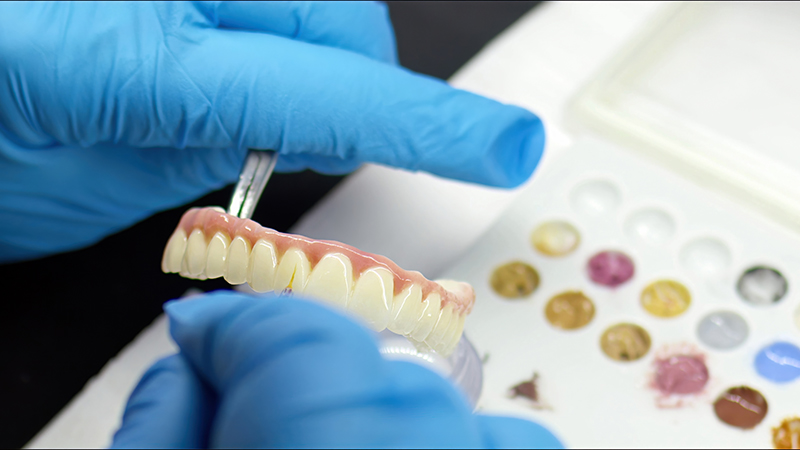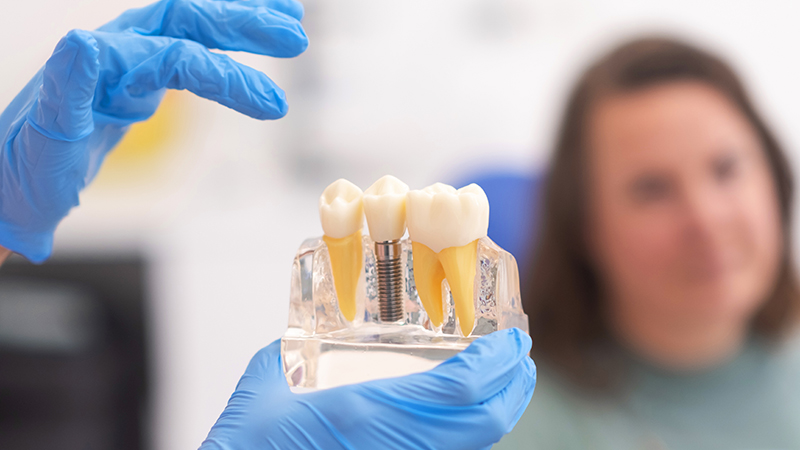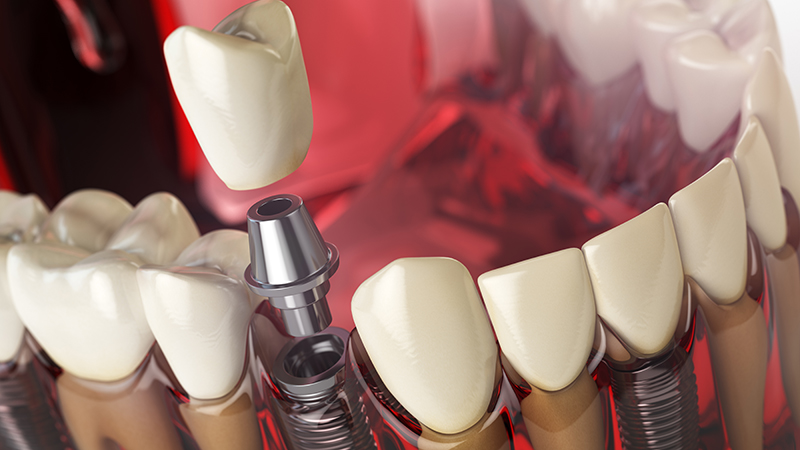
The dental implant process will involve several trips to our Montclair-based dental office, and a typical case will be completed in six to eight months. In most cases, every step of the implant process will take place at Double A Dental Group. Dr. Paula Izvernari and her assistants will work with you through the entire process to guarantee consistent and quality results, using state-of-the-art technology.
Dental implants are designed to be very stable and last a lifetime, making them the most reliable solution for tooth loss. The implants are surgically placed in the jawbone and will fuse with the surrounding bone. They will remain there forever, creating a very durable and reliable base for your dental restoration. They have a 98% success rate and are the number one recommended solution.
Replacing a missing tooth or teeth with dental implants will help keep your oral health in check. When teeth go missing, your gums begin to recede, the jawbone begins to deteriorate, and the surrounding teeth will begin to shift. You are also at a greater risk of gum disease and additional tooth loss. Dental implants are the next best thing compared to natural teeth.
The implant-anchored restoration will be fabricated to blend in seamlessly with your other teeth. Each restoration is custom-made to match the color of your other teeth and shaped to look like natural teeth. Not only do dental implants appear natural, but they also feel and function like your natural teeth. Since the implant posts are surgically placed in your jawbone, they are very stable and leave you with no worries of them slipping around or falling out. This will also allow you to eat a variety of foods with little to no restrictions.

Dentures can be permanently bonded into place using dental implants that have been surgically implanted into the jaw. Implant-secured dentures offer increased comfort, support, and function. Added benefits of securing dentures with implants:
Double A Dental Group offers a complete range of implant dentistry services, including all-on-4 dental implants. If you are missing a full arch or a complete set of teeth, all-on-4 implants can provide a permanent solution for your tooth loss.
In some cases, it may be possible to replace all your missing teeth in a day with the all-on-4 dental implants system. Dr. Paula Icvernari will work with you to explore your options and present the best solution for your smile.
Our goal is to help you achieve a natural-looking, long-lasting solution for your missing teeth.
To ensure your implant process is successful, we use state-of-the-art digital technology in the treatment planning and surgical aspects of your process. Prior to your treatment, we will evaluate the overall condition of your teeth, gums, bone structure, and surrounding area to find the most suitable placement for your implants.
If you need teeth extracted or need treatment for gum disease or tooth decay, we will address these issues before your implant surgery. Beginning the implant process on a structurally healthy smile is important.
During the all-on-4 implants procedure, Dr. Izvernari may use as few as four strategically placed implants to secure your dentures. Once a treatment plan is set in place, we will place your implants and attach a temporary restoration.
In many cases, implants will need several months to fuse with the jawbone fully. Once the implants heal, we will remove your temporary restoration and attach your custom-designed restoration for a long-lasting, natural-looking result.

Even just one missing tooth can lead to oral health issues and will compromise the appearance of your smile. These oral health issues include prolonged bad breath, the development of tooth decay and gum disease, and teeth shifting towards the gap. Teeth that shift are a major complication that can lead to painful TMJ issues. The sooner you seek treatment for your missing tooth, the less chance you have of developing complications.
Dental implants are the most natural solution to tooth loss. It is the only replacement option that replaces the tooth at the root to prevent bone loss. Double A Dental Group, located in Montclair, CA, offers full, in-house dental implant services. Our team possesses the experience, talent, and technology needed to restore dental health when a single tooth is lost.
Fixture - A dental implant is a metal, screw-like post that is surgically placed in the jaw where the missing tooth was located. This fixture will act as the missing tooth's root, which will prevent bone loss in the jaw. Implants come in a variety of shapes and sizes to properly support the size of the tooth being replaced.
Abutment - The abutment is the next part to be connected. It will be attached to the implant fixture during a minor procedure that only requires a local anesthetic. The purpose of this piece is to support the dental crown.
Crown - The prosthesis used to replace one tooth is a dental crown. This is the part of the implant that will mimic a natural tooth. Dental crowns can be personalized to fit perfectly in the mouth and blend naturally with the surrounding teeth.

Double A Dental Group offers many solutions for patients suffering from multiple missing or failing teeth. Having to choose which solution is right for you can be a tough decision, but Dr. Paula Izvernari is here to help you with that decision to her best knowledge.
Dental implants are considered the best option because of the multitude of benefits they possess. We offer several options for patients who need to replace multiple teeth. At your consultation, Dr. Izvernari will discuss each of the following options:
Since no two patients are the same, the cost of the dental implant treatment will also be unique for each patient. However, it is important to be informed of what will go into the cost of your teeth replacement treatment.
Dental implants are undoubtedly the number one solution for tooth loss, but they are also the most expensive. Dr. Izvernari will perform a thorough examination of your mouth and review your medical history to determine if you qualify for them. If you do, we will devise a treatment plan to replace your missing teeth with an implant-supported dental restoration. Many questions will need to be answered to create the treatment plan and give you an estimated cost.
Dental implant prices are exclusive of any insurance plans, which may alter the cost.
|
Single implant, abutment, & crown for a back tooth |
$3,900 |
|
2 implants, abutments, and crowns for back teeth |
$7,450 |
|
Single implant, abutment, and crown for a front tooth |
$4,050 |
|
2 implants, abutments, and crowns for front teeth |
$7,500 |
|
2 implants, and abutments for an existing lower denture (snap in denture) |
$3,800 |
|
2 implants, abutments, and new lower denture (snap in denture) |
$5,000 |
|
3 implants, abutments for an existing lower denture (snap in denture) |
$6,000 |
|
3 implants, abutments, and new lower denture (snap in denture) |
$6,900 |
|
4-6 implants and abutments for an existing upper or lower denture (snap in denture) |
$8,000 |
|
4-6 implants, abutments, and a new upper or lower denture (snap in denture) |
$9,900 |
|
All-On-Four or Six fixed hybrid bridge upper or lower (stays in place like teeth & does not come out) |
$21,995 |
|
All-On-Four or Six fixed zirconia bridge upper or lower (stays in place like teeth & does not come out) |
$22,995 |
|
Sinus Lift (internal) |
$400 |
|
Sinus Lift (lateral window) |
$2,100 |
|
Simple Bone Graft |
$450 |
|
Complex Bone Graft |
$500-1,000 |
|
CT ( 3D Cone Beam) Scan |
$280 |
|
Extractions |
$250-450 |
|
When extractions are needed, a secondary denture could be necessary after the healing process |
$1000 |
Most people qualify for dental implants, and there is no maximum age limit. Essentially, you need to be healthy enough for surgery and have sufficient bone structure to support the implant. For people who suffer from bone loss, our team may recommend bone grafting to ensure the success of your dental implants.
It is important to replace any missing teeth. Not only will you be embarrassed to smile, but it can also lead to more issues. A missing tooth will cause your teeth to shift towards the gap. This can cause issues with your bite and painful TMJ disorders. People with missing teeth also have a greater chance of suffering from gum disease, tooth decay, and additional tooth loss.
If you choose to get dental implants, you must be committed to good oral hygiene habits for the rest of your life to ensure their longevity. This includes brushing and flossing regularly and visiting our dental office every six months. With proper care, your implants can last a lifetime.
The process to have your implant secured restoration placed can take up to nine months and sometimes longer if you need significant dental work completed before having the implants surgically placed. After the implant(s) are placed, they will need time to fuse with the surrounding bone and heal. This can take up to three to six months. Next, the abutment will be attached to the implant, and impressions will be taken and used to fabricate your dental restoration. About two to three weeks later, the final restoration will be placed.
The industry average cost for an implant-secured dental crown is around $4,000. This is the total cost of the entire process, including the surgical placement of the implant, the abutment, the crown, and all the appointments involved. This is for a single missing tooth, and the cost will go up for multiple missing teeth.
When compared to other dental restorations, dental implants are the best option for your oral health. Implants are the only option available that replace the tooth at the root. This will prevent bone loss and all the negative effects of that. They are also more durable, allowing the patient to eat a healthier diet with few restrictions. Implants also do not require healthy teeth to be reduced, like a tooth-supported dental bridge does.
An implant is a biocompatible titanium post that is placed into the jawbone. Secured to the implant will be the dental restoration. For patients missing just one tooth, a single implant will be placed, and a dental crown will be secured to it. For multiple missing teeth, anywhere from two to eight implants may be placed, and a dental bridge, partial denture, or denture will be secured to them. The type of restoration and number of implants you will need depend on the location and number of missing teeth.